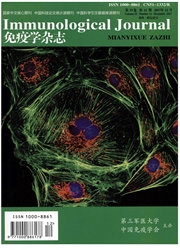

 中文摘要:
中文摘要:
目的观察芝麻素对肥大细胞炎症细胞因子释放的影响并探讨其可能的作用机制。方法体外培养HMC-1细胞,PMA和A23187体外诱导HMC-1细胞激活,ELISA和Western blot方法观察芝麻素对肿瘤坏死因子-α(TNF-α)、白细胞介素-6(IL-6)释放及p38、NF-κB p65活化的影响。结果 PMA和A23187能激活HMC-1细胞,促进p38磷酸化和NF-κB p65核转位,提高TNF-α和IL-6合成和释放(P〈0.05)。芝麻素高(100μg/L)、中(50μg/L)质量浓度明显抑制HMC-1细胞TNF-α、IL-6合成和释放,降低p38磷酸化,减少NF-κB p65核转位(P〈0.05)。p38和NF-κB抑制剂都能明显抑制TNF-α、IL-6的合成和释放(P〈0.05)。结论芝麻素通过调节p38和NF-κB激活抑制肥大细胞炎症细胞因子释放。
 英文摘要:
英文摘要:
The discovery of drugs for the treatment of allergic disease is an important subject in human health.Sesamin is known to have a wide range of pharmacological properties. However, the roles of sesamin in mast cellmediated inflammatory response have not yet been investigated. The aim of the present study was to investigate the effect of sesamin on the mast cell-mediated inflammatory cytokines release and study its possible mechanisms of action. HCM-1 cells were cultured and stimulated by PMA plus A23187 in vitro. Then ELISA and Western blot was used to determine the effect of sesamin on p38 MAPK phosphorylation, NF-κB p65 nuclear translocation and production of cytokines(TNF-α and IL-6) in HCM-1 cells. Data showed that PMA plus A23187 stimulation promoted p38 phosphorylation, NF-κB p65 nuclear translocation and production of cytokines(TNF-α and IL-6) in HMC-1 cells(P 〈 0.05). Sesamin(50, 100 μg/L) specifically inhibited the activation of p38 MAPK and NF-κB.Furthermore, sesamin and a specific inhibitor of p38 MAPK, SB203580, reduced TNF-α and IL-6 production(P 〈0.05). Sesamin(50, 100 μg/L) also decreased NF-κB p65 level in nucleus but increased NF-κB p65 protein level in cytosolic extracts of PMA plus A23187 stimulated mast cells. Moreover, sesamin and a potent NF-κB inhibitor,PDTC, decreased TNF-α and IL-6 production(P 〈 0.05). Our result provides evidence that sesamin can attenuate mast cell-mediated inflammatory cytokines release through suppressing of p38 MAPK and NF-κB activation.Furthermore, anti-inflammatory effect of sesamin suggests a possible therapeutic application in inflammatory allergic diseases.
 同期刊论文项目
同期刊论文项目
 同项目期刊论文
同项目期刊论文
 期刊信息
期刊信息
